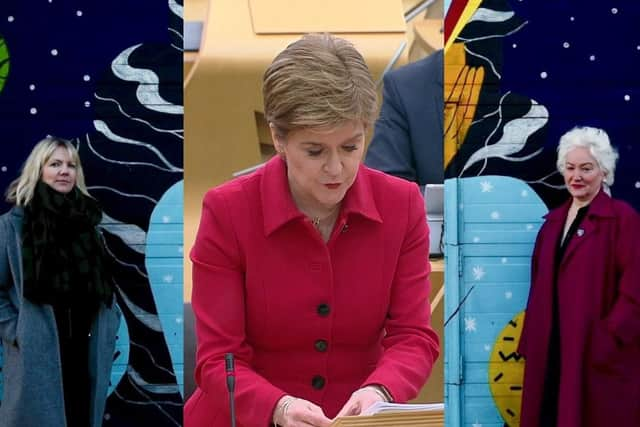Witches of Scotland: Nicola Sturgeon urged to give apology to persecuted women and men under Witchcraft Act
and live on Freeview channel 276
The request comes as Witches of Scotland founders Claire Mitchell QC and Zoe Venditozzi gave evidence at a Scottish Parliament committee on Wednesday for their petition to pardon and memorialise those convicted under the Witchcraft Act in 1563.
In Scotland, an estimated 3,837 people – 84 per cent of whom were women – were tried as witches under the Act, according to the Survey of Scottish Witchcraft.
About 2,500 of those accused were executed and burned.


Advertisement
Hide AdAdvertisement
Hide AdThe last person believed to be executed under the Act was Janet Horne in either 1722 or 1727.
To date, there has been no apology, no pardon and no memorial to those who lost their lives in Scotland.
The group – founded on International Women’s Day in 2020 – seeking these three goals has sent a letter to Ms Sturgeon asking for a formal apology next month.
Ms Mitchell said the trials were conducted by the state, therefore “it is appropriate” for the Scottish Government to provide an apology.
Advertisement
Hide AdAdvertisement
Hide AdShe said: "We have written directly to the Scottish Government and the First Minister requesting that the First Minister consider the Government giving an apology on International Women’s Day [on March 8] this year.
"We haven't heard back yet so I don’t know whether that will happen, but the apology is broad and to encapsulate all those accused as only those convicted can be pardoned.”
Ms Mitchell said the date was chosen “given the gendered nature the way the Act was implemented”.
A private member’s bill to pardon those accused is to be brought to Parliament by MSP Natalie Don.
Advertisement
Hide AdAdvertisement
Hide AdA draft consultation of the Bill will be published on Thursday as the consultation process remains ongoing.
Witches of Scotland are also seeking a national monument for those persecuted – similar to the Steilneset Memorial in Norway – erected in memory of 91 victims of the witch trials held in Finnmark.
A museum of witch hunts has also been suggested.
Ms Venditozzi said: "We have such an incredible body of artists in Scotland to make something striking that shows Scotland is a forward-thinking nation.”
Speaking about the reasons behind why people were accused of witchcraft, Ms Venditozzi added: “Sadly, it could be anything.
Advertisement
Hide AdAdvertisement
Hide Ad"It could be you were a difficult or vulnerable person in the community or somebody wanted your land.
"There’s a misrepresentation that it was healers and midwives, but that is just a small percentage, according to recent research.”
Misconceptions of witches include women with red hair. But Ms Mitchell said, quoting a local memorial in Orkney: “They were just folk.”
Forms of torture included keeping people awake for days during an enquiry period until they ‘confessed’.
Advertisement
Hide AdAdvertisement
Hide AdWhen people were in a state of delirium, they tragically gave the names of their ‘coven members’ as those in their families or loved ones.
People were often executed by being strangled and then their bodies were burnt with no burial.
Ms Mitchell said she took inspiration for the petition from the book Where are the Women? by Sara Sheridan, which re-imagines Scotland where all the streets and statues are dedicated to women.
A message from the Editor:
Thank you for reading this article. We're more reliant on your support than ever as the shift in consumer habits brought about by Coronavirus impacts our advertisers.
If you haven't already, please consider supporting our trusted, fact-checked journalism by taking out a digital subscription.
Comment Guidelines
National World encourages reader discussion on our stories. User feedback, insights and back-and-forth exchanges add a rich layer of context to reporting. Please review our Community Guidelines before commenting.
